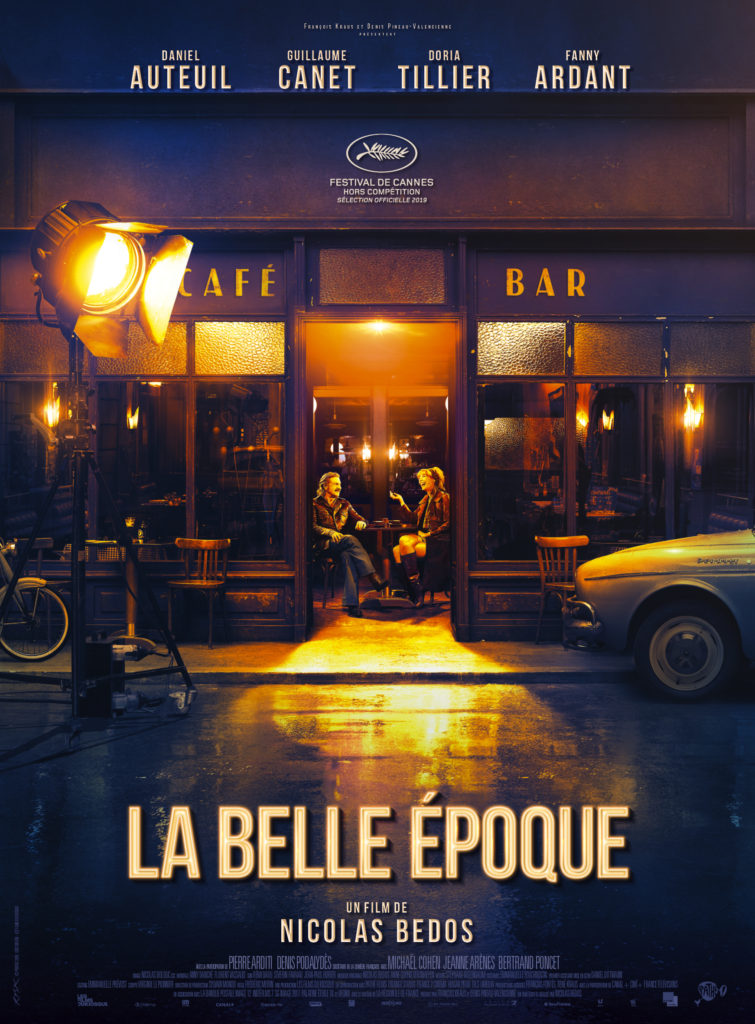NZIFF 51 – Film Review: La Belle Époque
La Belle Époque seemed the perfect choice for opening night at the 51st New Zealand International Film Festival, delivering a remarkable ensemble cast and razor-sharp comedic writing to a packed and joyous Civic Theatre crowd.
Director: Nicolas Bedos. Starring: Daniel Auteuil, Guillaume Canet, Doria Tillier, Fanny Ardant, Pierre Arditi, Denis Podalydès.
 The second film by French writer-director Nicholas Bedos, La Belle Époque is, at its heart, a romantic-comedy exploring the highs and lows of enduring love, and the dedication required to make both love and a marriage work once lust and outward youth have subsided.
The second film by French writer-director Nicholas Bedos, La Belle Époque is, at its heart, a romantic-comedy exploring the highs and lows of enduring love, and the dedication required to make both love and a marriage work once lust and outward youth have subsided.
Apathetic, out-of-touch cartoonist Victor (Daniel Auteuil) and ultra-chic psychoanalyst Marianne (Fanny Ardant) have been together for over forty years, with their polarising pathways toward ageing leading to a hilariously heartbreaking separation. Victor is playfully mocked by his son and wife in hushed voices as he struggles to understand digital media, wears ‘granddad pyjamas’ and sports a snowy Hemingway beard, while Marianne indulges in virtual reality experiences in bed, constantly draws on her elegant e-cigarette, and seems incapable of delivering anything less than eviscerating, hyper-aware observations.
In an exasperated act of liberation, Marianne dramatically forces Victor out of their home, leaving the pyjama-wearing human silhouette on the steps of their apartment, where he smokes a joint and finds himself reconnecting to a pile of his old drawings from the couple’s youth. The plot of La Belle Époque pivots between this painful and often-sterile present day and the manufactured reality of Lyon in 1974 – courtesy of the Midnight In Paris meets Westworld group, Time Travellers.
Time Travellers is a constructed-reality experience where wealthy individuals pay the company to reconstruct elaborate fictional situations for their pleasure. The opening scene of the film features a darkly hilarious rendition of this experience, with later moments showing the awkward authenticity of Nazi-era Germany and the difficulty in finding a suitable Ernest Hemingway double that isn’t allergic to alcohol. The company is run by the highly controlling and critical Antoine (Guillaume Canet), a childhood friend of Victor’s son, who offers Victor a free experience with the group.
Victor chooses to spend his time in Lyon, France of 1974, at the hotel bar where he first met Marianne, an experience pulled together by his recounts and early drawings. The plot and story of the film are remarkably lean and focussed, moving between the ensemble cast in a fluid and natural way – each character perfectly placed, each line of dialogue reduced to le mot juste, and with a conclusion that feels heartwarming and embracing of life in all its natural, unpredictable beauty.
Lead performances by Daniel Auteuil and Fanny Ardant are exquisite and heartbreakingly authentic. Dora Tillier, as the fiery and independent Margot cast in the role of 1974 Marianne, convincingly ignites a forgotten passion in Victor and subsequent jealousy from behind-the-scenes director and on-off lover, Antoine. While these four make up the foundation of the film, any divergence feels comfortably welcome, the supporting cast never weigh the film down or distract from the overall tone.
The only potential criticism of the film would be in its historical accuracy, though this often felt like a subtle and purposeful decision – a song from 1977 features prominently in a scene from 1974, the music as a whole feeling like a stereotyped guess than authentic memory – which seems to drive home the underlying message in the film itself; memory is often hazy, idealistic, and inaccurate. The beauty of memory is not in the glamour, but in the details, the inexplicable moments that inspire our individual character in a way often impossible to explain – that often we aren’t looking to fall in love with someone else, but to learn how to truly love ourselves again.
Oxford Lamoureaux
- The Dead South – Powerstation: April 5, 2024 (Concert Review) - April 6, 2024
- Queens of The Stone Age – Spark Arena: February 29, 2024 (Concert Review) - March 1, 2024
- Dune: Part Two – Dir: Denis Villeneuve (Film Review) - February 29, 2024
